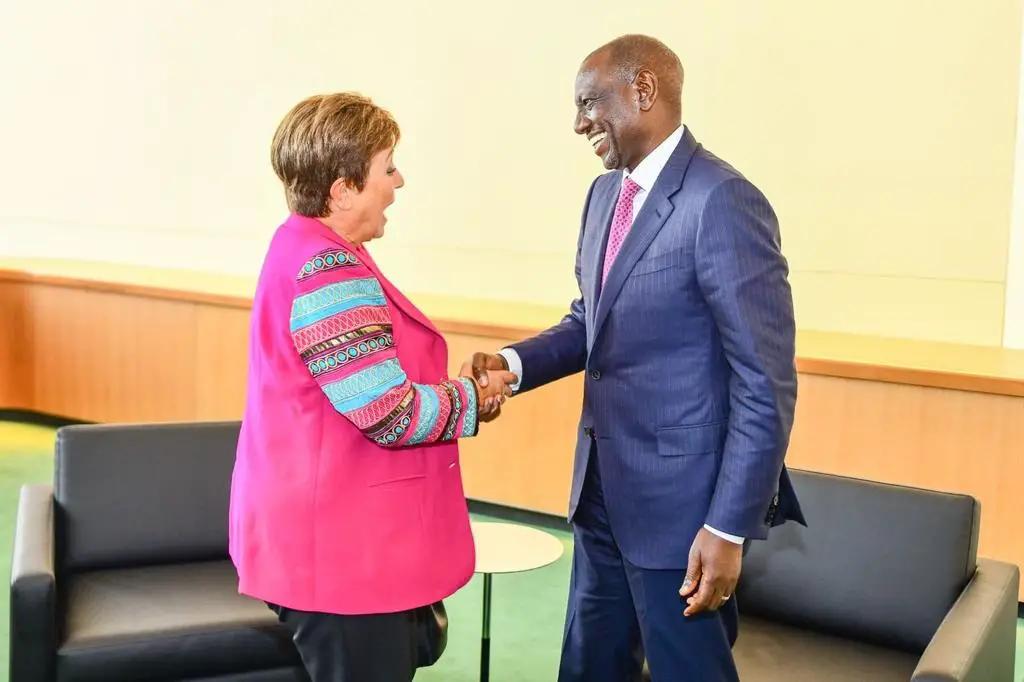- The IMF has agreed to loan $938 million to Kenya subject to management approval and consideration by the Executive Board, which is expected in January 2024.
- The move is aimed at cautioning the country from liquidity problems and economic difficulties following the impact of COVID-19, the Ukraine War, and drought.
- Kenya’s public debt currently stands at $66.4 billion as of May 2023, with a $2 billion Eurobond expected to mature in June 2024.
The International Monetary Fund (IMF) has agreed to lend $938 million to Kenya, pending management approval and consideration by the Executive Board. The board is expected to make its decision in January 2024.
Haimanot Teffara, the IMF Mission Chief to Kenya, stated that the move aims to shield the country from liquidity problems and economic difficulties resulting from the adverse impacts of COVID-19, the Ukraine War, and drought.
IMF optimistic about Kenya’s economy
Teffara explained, “The tightening global financing conditions for frontier economies and global geopolitical tensions are compounding the challenges from the legacy of the pandemic and multi-season drought, further straining Kenya’s balance of payments and fiscal financing requirements.
The authorities’ strong reform program aims to enhance macroeconomic stability and restore confidence to ensure access to the international bond markets.”
The IMF is optimistic about Kenya’s resilient economy, which grew by 5.4 percent in the first half of 2023, attributed to a robust recovery in the agriculture sector following the return of rains.
“Financing conditions continue to be challenging. With a tightening of monetary policy in June and tighter liquidity conditions, yields on government bonds have experienced a notable upward trend.
The external current account deficit has narrowed, driven by a recovery in the tourism sector to pre-COVID-19 levels, resilience in remittances, reductions in imports, and a real exchange rate depreciation,” Teffara added.
As of May 2023, Kenya’s public debt is $66.4 billion, with a significant Eurobond valued at $2 billion expected to mature in June 2024. After the IMF Executive Board approves, Kenya would have immediate access to $682.3 million.
“Despite continued commitment to the implementation of the IMF-supported economic program, which is broadly on track, uncertainty looms over Kenya’s effective access to international bond markets. This uncertainty is exerting substantial pressure on liquidity, primarily due to the sizable Eurobond maturing in 2024,” Teffara cautioned.
The global lender has urged the country to reduce its expenditure and focus on enhancing public investment efficiency.
Read also: IMF cuts Sub-Saharan Africa GDP growth forecast to 3.5%
IMF to Kenya: Improve tax compliance
“A tighter fiscal stance will help reduce debt vulnerabilities and achieve a debt/GDP ratio of 55 percent, which is the authorities’ debt anchor, by 2029. This will require the timely implementation of reforms to broaden the domestic tax base and improve tax compliance.
These reforms are crucial for achieving the authorities’ revenue objectives, aiming to reverse the trajectory of the tax revenue-to-GDP ratio while promoting equity and fairness in the tax regime,” he added.
The IMF also welcomed the Central Bank of Kenya’s (CBK’s) steps to modernize the monetary policy framework and improve the functioning of the Forex market.
The recent introduction of an interest rate corridor centered around the policy rate, aimed at guiding the interbank rate, is anticipated to enhance monetary policy transmission.
Additionally, initiatives like the DhowCSD and other policy adjustments are expected to stimulate interbank repos, potentially minimizing market fragmentation.
“Further efforts to improve the functioning of the FX market and greater exchange rate flexibility would reduce the costs to the real economy from large spreads and excess FX demand while encouraging capital inflows and reducing outflows.
Credible and mutually reinforcing policies would help maintain favorable inflation differentials with trading partners, boost export competitiveness, and mitigate balance of payments pressures. Efforts, including to strengthen the macroprudential policy framework, will be key to reducing financial sector risks,” he noted.
In July 2023, the IMF approved almost $1 billion for Kenya under the Extended Fund Facility and Extended Credit Facility, programs designed to shore up its economy and boost its foreign exchange reserves after the country met conditions for continued financing under programs to help reform the economy.
